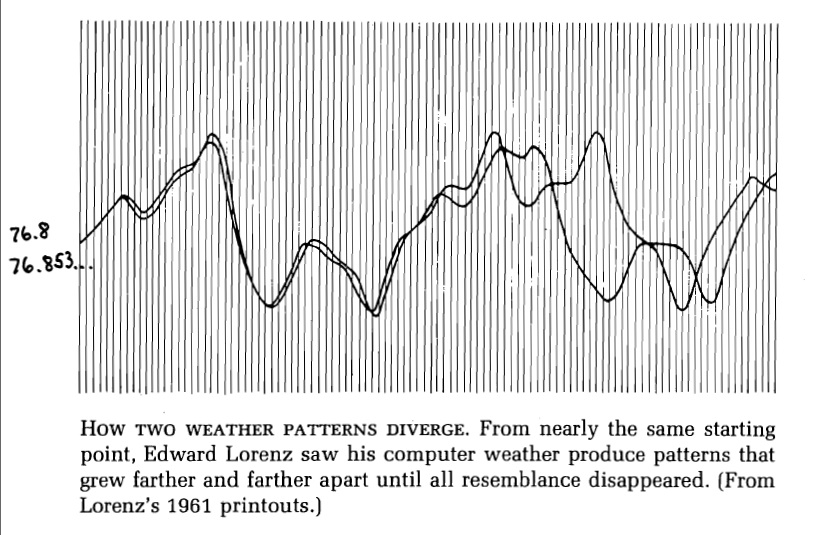Purpose is not optional, but awakening it is.
You and whatever you do in your life, work, or organization has an inevitable, far-reaching consequence on the world. The key mindset shift to living and leading with purpose is taking responsibility for that inevitable consequence on others’ lives, to believe that you and what you do matters. In organizations, that means helping others see and believe the impact of the work.
And scientifically, we can’t not matter.
In 1969 MIT meteorology professor Edward Lorenz was re-running a weather simulation for the next two months to confirm its results. This time, however, he mistakenly rounded an input variable from .506127 to .506. Not a big deal, right?
It was a massive deal.
Although the adjustment was minuscule, it created chaos. When Lorenz checked the computer the next day, it had produced a completely different weather forecast model for the next two months. The discovery rocked the scientific world and was a foundation for chaos theory which rests on the assumption that everything in our world has a sensitive dependence on everything else—including people.

Ed Lorenz’s actual output showing completely diverging weather patterns.
The phenomenon became known as “The Butterfly Effect,” the since popularized idea that a butterfly flapping its wings will, at some point, inevitably alter the world’s weather pattern.
What Does Systems Thinking Mean for People and Organizations?
The systems which make up our societies and world are so complex that even the smallest change will lead to unpredictable, far-reaching results. What does this mean for people and organizations? When applied to our lives and work, the basic tenet of systems thinking asserts that all of us invariably matter in the world.
As individuals and organizations, then, we have an impact by default. When made visible, this impact is our purpose.
The practice of discovering and aligning purpose is the process of making our inevitable impact on the world clear and communicable. In organizations, that means ensuring that it is shared. And research steadily finds that when we are able to recognize, imagine, and trace the impact of even our smallest actions on other people in our lives and work, we experience a greater sense of meaning and purpose.
But perhaps the most powerful lesson in applying systems thinking to our lives, work, and organizations is that purpose is not optional.
Unfortunately, we don’t get a text message or e-mail each time we change the world through our everyday work and lives. We won’t even live long enough to follow our inevitable impact to its end.
That’s why it’s critical that we make our possible impact visible and real to ourselves and the people in our organizations.
How to Make Impact Visible
1. Encourage and use imagination.
One of my favorites quotes is “…a river touches places of which its source knows nothing.” Most of the time we’ll never see the ends of the activities of our lives and work. We won’t see a product improving someone’s life, a service fulfilling a desperate need, or the way a simple conversation changes a friend’s day. To experience our impact, we have to imagine it.
2. Use thought experiments.
Another powerful way to “see” the impact of the work is through thought experiments. Especially if you’re feeling burned out at work, try asking, “What would happen if my job didn’t exist?” Trace it to its end. Almost anyone in any position will see that the work actually matters in a human being’s life. Focus on that impact.
3. Show the impact.
Finally, find proof points of your impact. If you’re a leader in an organization, consistently bring in people to share how the work impacted their lives. As an individual, recognize the spaces you’re in where you improve others’ lives.
When we believe that we matter, we allow ourselves to discover that we all have purpose.
